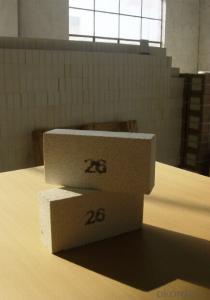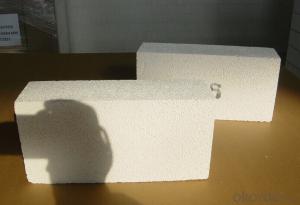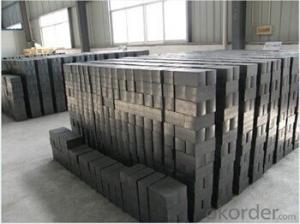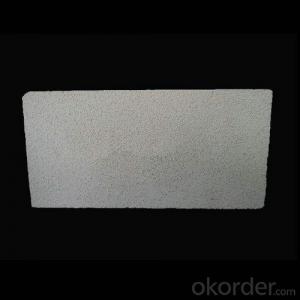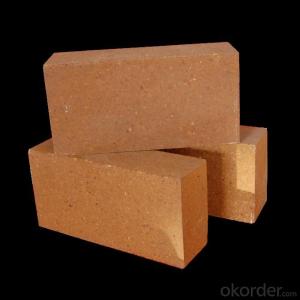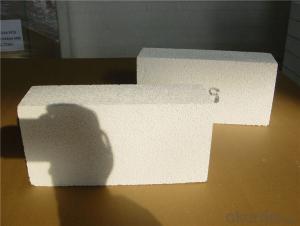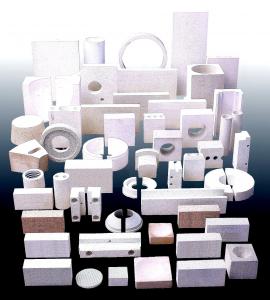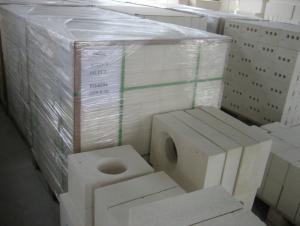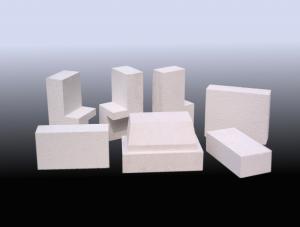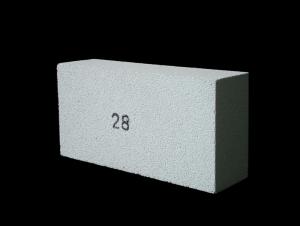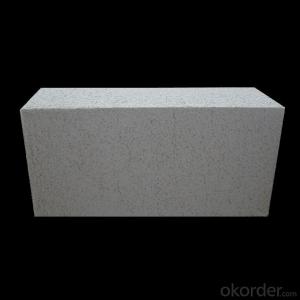Insulation Bricks Refracotry Or Insulation Fire Brick High Quality 23 26
- Loading Port:
- Shanghai
- Payment Terms:
- TT OR LC
- Min Order Qty:
- 5000 pc
- Supply Capability:
- 50000 pc/month
OKorder Service Pledge
OKorder Financial Service
You Might Also Like
1.Description of Insulation Brick:
CMAX insulating firebricks are classified under temperature between 1100℃ to 1700℃, manufactured from high purity alumina clay..
2.Main features of Insulation Brick:
◆Light weight and low thermal conductivity ◆Low heat storage
◆Low iron and impurities ◆High thermal shock resistance
3. Insulation Brick Images:
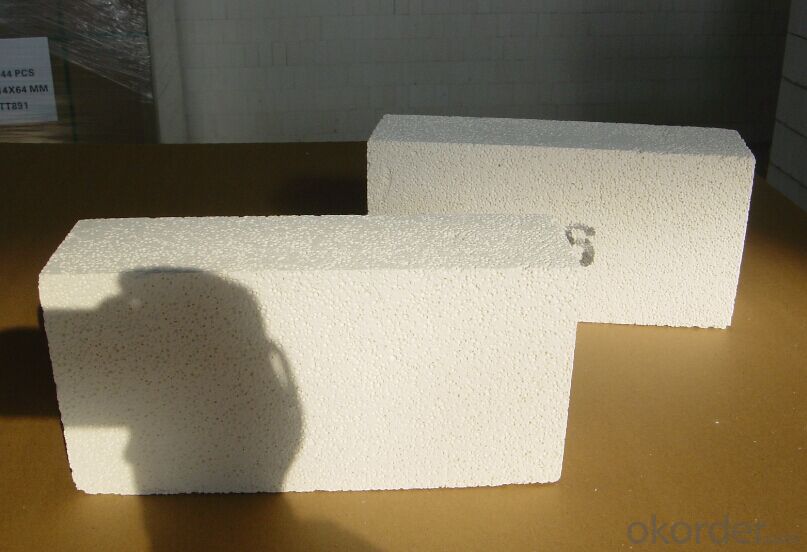
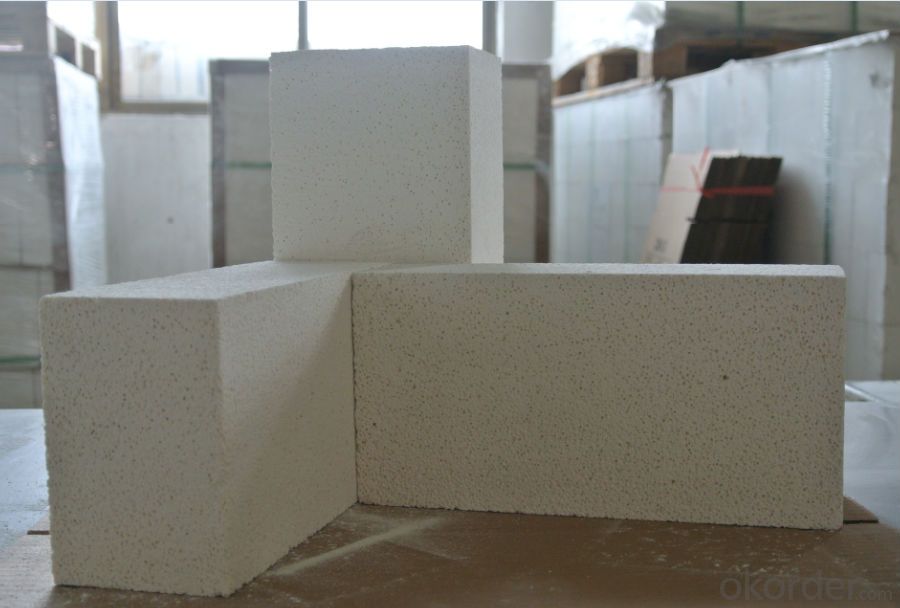
4. Insulation Brick Technical Parameters
Our Insulation Brick contains 20, 23, 25,26, 28, 30, 32. Classification temperature is from 1100℃ to 1760℃. Density is from 0.52g/cm3 to 1.25g/cm3. As we all know, the company type is 23 and 26.
1) For the 23, its density is 0.52g/cm3, but some customer may require 0.8g/cm3, we can also meet your special require. Content of Al2O3 is about 45%.
2) For the 26, its density is 0.8g/cm3, but if you have other special requirement on that, pls also tell us. Content of Al2O3 is about 55%.
Application: CMAX insulating firebricks can be used as a hot face lining directly exposed to the heat or as a backup insulation layer in iron and steel mills, non-ferrous foundries, petrochemical, ceramic, glass. If you need other application picture, please contact with us
5.FAQ
We have organized several common questions for our clients,may help you sincerely:
① How about our Insulation Brick?
A world class manufacturer & supplier of InsulationBrick is one of the large scale professional investment casting production bases in China,consisting of both casting foundry forging and machining factory. Annually more than 8000 tons Precision casting and forging parts are exported to markets in Europe,America and Japan. OEM casting and forging service available according to customer’s requirement.
②How to guarantee the quality of the products?
We have established the international advanced quality management system every link from raw material to final product we have strict quality test; We resolutely put an end to unqualified products flowing into the market. At the same time, we will provide necessary follow-up service assurance.
- Q:Are insulating fire bricks resistant to warping?
- Yes, insulating fire bricks are generally resistant to warping. Insulating fire bricks are designed to withstand high temperatures and thermal shocks, which helps prevent warping. These bricks are made from lightweight materials such as clay, silica, and alumina, combined with additives to enhance their insulating properties. These additives also contribute to the brick's ability to resist warping. Additionally, insulating fire bricks undergo a specific manufacturing process that helps ensure dimensional stability and minimize the risk of warping. However, it's important to note that extreme and prolonged exposure to high temperatures can still cause some degree of warping, but compared to other types of bricks, insulating fire bricks offer a higher level of resistance.
- Q:Are insulating fire bricks resistant to acid attack?
- Insulating fire bricks are known for their resistance to acid attack. They are manufactured using durable materials that can withstand high temperatures and offer excellent insulation properties. These bricks are typically composed of lightweight refractory materials like alumina, silica, and other refractory oxides, which are renowned for their ability to resist chemical corrosion, including acids. Nevertheless, it is crucial to acknowledge that the acid resistance of insulating fire bricks can vary depending on their specific composition and manufacturing process. Some bricks may exhibit higher resistance to acids than others. Therefore, it is advisable to consult the manufacturer or supplier for detailed information regarding the acid resistance of their insulating fire bricks. Generally, insulating fire bricks are widely used in various applications where they may encounter acids, such as industrial furnaces, kilns, and high-temperature environments. They are valued for their durability and capacity to withstand harsh chemical surroundings, including acid exposure. However, it is always essential to consider the precise chemical composition and concentration of the acids involved, as well as the temperature conditions, to determine the suitability of insulating fire bricks for a particular application.
- Q:Are insulating fire bricks resistant to thermal bridging?
- Yes, insulating fire bricks are resistant to thermal bridging. Thermal bridging occurs when there is a direct path for heat to flow through a material, bypassing the insulation. Insulating fire bricks are designed to minimize this by having low thermal conductivity, which means they are not effective at conducting heat. This helps to maintain a consistent temperature on both sides of the brick, preventing thermal bridging and improving the overall insulation performance.
- Q:Do insulating fire bricks require any special fireproofing treatments?
- No, insulating fire bricks do not require any additional fireproofing treatments as they are already designed to withstand high temperatures and provide insulation.
- Q:Can insulating fire bricks be used for insulation in sewage treatment plants?
- Yes, insulating fire bricks can be used for insulation in sewage treatment plants. Insulating fire bricks are specifically designed to withstand high temperatures and provide excellent insulation, making them suitable for use in environments where heat and moisture are present, such as sewage treatment plants. These bricks have low thermal conductivity, which helps to reduce heat loss and increase energy efficiency in the treatment process. Additionally, their resistance to chemicals and moisture makes them ideal for withstanding the corrosive environment found in sewage treatment plants. Therefore, insulating fire bricks can effectively provide insulation in sewage treatment plants, helping to maintain optimum operating temperatures and improve overall efficiency.
- Q:Can insulating fire bricks be used in the construction of ceramic fiber kilns?
- Yes, insulating fire bricks can be used in the construction of ceramic fiber kilns. Insulating fire bricks provide excellent thermal insulation, which helps to retain heat and improve energy efficiency in kilns. They are often used as the lining material in kilns to prevent heat loss and ensure efficient firing processes.
- Q:Do insulating fire bricks have a high resistance to spalling?
- Insulating fire bricks possess a remarkable ability to resist spalling. Spalling occurs when the surface of a material breaks or flakes off, and fire bricks are particularly susceptible to this phenomenon due to exposure to intense heat and thermal shock. However, insulating fire bricks are specially engineered to endure these extreme temperatures and thermal cycling, resulting in a significant resistance to spalling. These bricks are crafted from top-notch refractory materials like alumina or silica, renowned for their exceptional thermal shock resistance. Furthermore, they are manufactured with low thermal conductivity, effectively reducing heat transfer and minimizing the chances of spalling. In summary, insulating fire bricks are the perfect choice for applications demanding high spalling resistance, such as furnaces, kilns, and other environments with elevated temperatures.
- Q:Can insulating fire bricks be used in ladles and tundishes?
- Yes, insulating fire bricks can be used in ladles and tundishes. Insulating fire bricks are designed to provide high-temperature insulation and thermal stability, making them suitable for applications where heat retention is important. Ladles and tundishes are used in the steel and foundry industries to transport and pour molten metal, and the use of insulating fire bricks in these vessels can help to minimize heat loss and maintain the desired temperature of the metal. Additionally, insulating fire bricks can resist thermal shock and chemical corrosion, which are common challenges in these high-temperature environments. Therefore, using insulating fire bricks in ladles and tundishes can improve energy efficiency, reduce heat loss, and enhance the overall performance and longevity of these crucial equipment in the metal processing industry.
- Q:Do insulating fire bricks require any special installation techniques?
- Yes, insulating fire bricks require special installation techniques. These bricks are typically lightweight and have low thermal conductivity, making them highly effective in insulating applications. To ensure proper installation, it is important to follow the manufacturer's guidelines and use appropriate tools, such as refractory mortar or adhesive, to securely bond the bricks together. Additionally, proper curing and drying procedures should be followed to avoid any potential cracking or damage during the installation process.
- Q:Can insulating fire bricks be used for insulation in steel mills?
- Yes, insulating fire bricks can be used for insulation in steel mills. Insulating fire bricks are made from lightweight refractory materials that have excellent insulating properties and can withstand high temperatures. They are designed to minimize heat transfer and maintain the desired temperature inside the furnace or kiln. In steel mills, these bricks can be used to insulate the walls, floors, and roofs of the furnaces, ladles, and other equipment. This insulation helps to reduce heat losses, improve energy efficiency, and ensure consistent and controlled heating processes. Additionally, insulating fire bricks can provide thermal stability and protect the steel mill equipment from excessive heat, contributing to longer equipment lifespan and reduced maintenance costs.
1. Manufacturer Overview |
|
|---|---|
| Location | |
| Year Established | |
| Annual Output Value | |
| Main Markets | |
| Company Certifications | |
2. Manufacturer Certificates |
|
|---|---|
| a) Certification Name | |
| Range | |
| Reference | |
| Validity Period | |
3. Manufacturer Capability |
|
|---|---|
| a)Trade Capacity | |
| Nearest Port | |
| Export Percentage | |
| No.of Employees in Trade Department | |
| Language Spoken: | |
| b)Factory Information | |
| Factory Size: | |
| No. of Production Lines | |
| Contract Manufacturing | |
| Product Price Range | |
Send your message to us
Insulation Bricks Refracotry Or Insulation Fire Brick High Quality 23 26
- Loading Port:
- Shanghai
- Payment Terms:
- TT OR LC
- Min Order Qty:
- 5000 pc
- Supply Capability:
- 50000 pc/month
OKorder Service Pledge
OKorder Financial Service
Similar products
New products
Hot products
Related keywords
